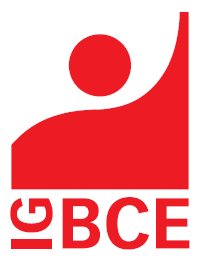Related Research Articles

The IG Bergbau, Chemie, Energie is a trade union in Germany. It is one of eight industrial affiliations of the German Confederation of Trade Unions (DGB).

The Factory Workers' Union of Germany was a trade union in Germany.

The Trade Unions International of Chemical, Oil and Allied Workers was a trade union international affiliated with the World Federation of Trade Unions. It was often known by its French initials, ICPS.

Gabriele "Gabi" Weber is a German politician of the Social Democratic Party (SPD) who served as a member of the German Bundestag from 2013 until 2021.
The German Ceramic Society is an association founded in 1919 and headquartered in the city of Cologne, Germany. With its more than 600 personal and 250 institutional members, it is the largest ceramics society in Europe. Worldwide, it is one of the oldest associations in this field.
Buna Werke Schkopau were a chemical company specialising in the production of polymer materials such as plastics and artificial rubber. The name BUNA is derived from the technology of polymerising butadiene with sodium as a catalyst.
The Union of Mining and Energy was a trade union in West Germany which existed from 1946 until 1997.
The Chemical, Paper and Ceramic Union was a trade union representing chemical, oil refinery, paper, rubber, ceramics, glass and plastics workers in West Germany.
Karl Hauenschild was a German trade union leader and politician.

The German Agricultural Workers' Union was a trade union representing agricultural and forestry workers in Germany.
The Industrial Union of Metal was a trade union representing workers in the metal and electronic industries in East Germany.
The Industrial Union of Textiles, Clothing and Leather was a trade union representing workers in the textile, clothing, leather, and tobacco industries in East Germany.
The Industrial Union of Mining and Energy was a trade union representing the mining, energy and water industries in East Germany.
The Union of Land, Food and Forests was a trade union representing workers in various related industries in East Germany.
The Industrial Union of Construction and Wood was a trade union representing construction and wood workers in East Germany.
The Industrial Union of Printing and Paper was a trade union representing workers in the printing industry in East Germany.
The Wismut Industrial Union was a trade union representing workers at the Wismut uranium mining company.
General Union of Miscellaneous Industries was a general union in the Netherlands, focusing on manufacturing industries.
The Union of Textiles, Chemicals and Paper was a trade union representing workers in various industries in Switzerland.

Michael Zissis Vassiliadis is President of the Mining, Chemical and Energy Workers' Union in Germany and President of the European Confederation of Industrial Trade Unions IndustriAll Europe.